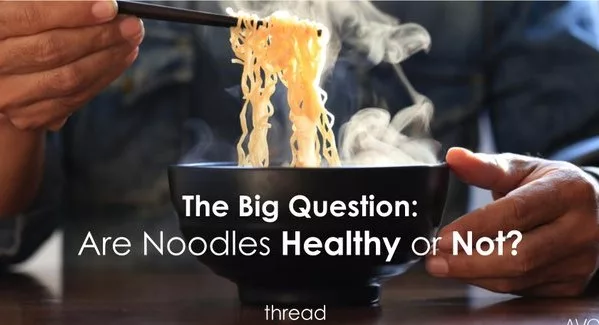
Are Instant Noodles Healthy?
Occasionally, the debate resurfaces regarding the health implications of indulging in instant noodles. It’s not the discourse itself that’s problematic; rather, it’s the barrage of conflicting information often devoid of credibility.
Instant noodles have garnered global popularity for their convenience, affordability, and ease of preparation. Yet, their nutritional profile, characterized by minimal nutrients and high levels of sodium and MSG, consistently ignites controversy over their health implications.
Let’s delve into the ingredients.
Typically, noodles comprise flour, salt, and palm oil, while flavouring packets contain salt, seasoning, and monosodium glutamate (MSG). Interestingly, instant noodles are pre-cooked noodles that undergo steaming and drying processes.
While there’s variability among brands and flavours, most instant noodles share common nutritional traits. They tend to be low in calories, fibre, and protein, but rich in fat, carbohydrates, sodium, and select micronutrients.
Calorie content
Instant noodles typically pose no significant issue. For example, a 70g pack typically contains fewer than 400 calories. Even if one were to consume two packs, totalling 800 calories, it would generally fall within the recommended daily calorie intake of 2,000 for women and 2,500 for men.
However, the low fibre and protein content in instant noodles may not make them ideal for weight loss. Protein promotes satiety and reduces hunger, aiding in weight management, while fibre enhances feelings of fullness and supports weight loss by slowing digestion. Consequently, instant noodles may temporarily alleviate hunger but fail to provide sustained satiety compared to nutrient-rich foods.
Conversely, instant noodles may offer essential micronutrients despite their low nutritional value. Some variants contain iron, manganese, folate, and B vitamins. Yet, the inclusion of MSG, a common flavour enhancer, adds complexity to their health profile. While generally regarded as safe, MSG’s potential health effects remain disputed, with studies suggesting links to weight gain, increased blood pressure, and adverse symptoms in sensitive individuals.
Sodium Content
Instant noodles are notorious for their high sodium content, with a single serving providing between 861 to 1,200mg. Exceeding the recommended daily intake of 2,300mg can have detrimental effects on cardiovascular health, including elevated blood pressure and increased risk of kidney disease.
How to Consume Instant Noodles Safely
To mitigate health risks, it’s advisable to limit sodium intake to 1,500mg per day. Incorporating instant noodles into one’s diet in moderation, supplemented with nutritious ingredients like vegetables and proteins, can mitigate potential adverse effects. However, making them a staple is ill-advised.
In conclusion, occasional consumption of instant noodles is unlikely to yield significant negative health outcomes. Yet, it’s essential to maintain a balanced diet and exercise caution regarding sodium intake. Utilizing instant noodles as a base for nutritious meals and opting for single seasoning packs can enhance their nutritional value while minimizing health risks.
So, are instant noodles healthy or not? With these facts, you should be able to make up your mind.
Also Read: Only Carbs? 7 Protein-rich foods to include in your Nigerian diet
References
Healthline: https://www.healthline.com/nutrition/instant-noodles
The Balanced Nutritionist: https://thebalancednutritionist.com/are-noodles-healthy/



